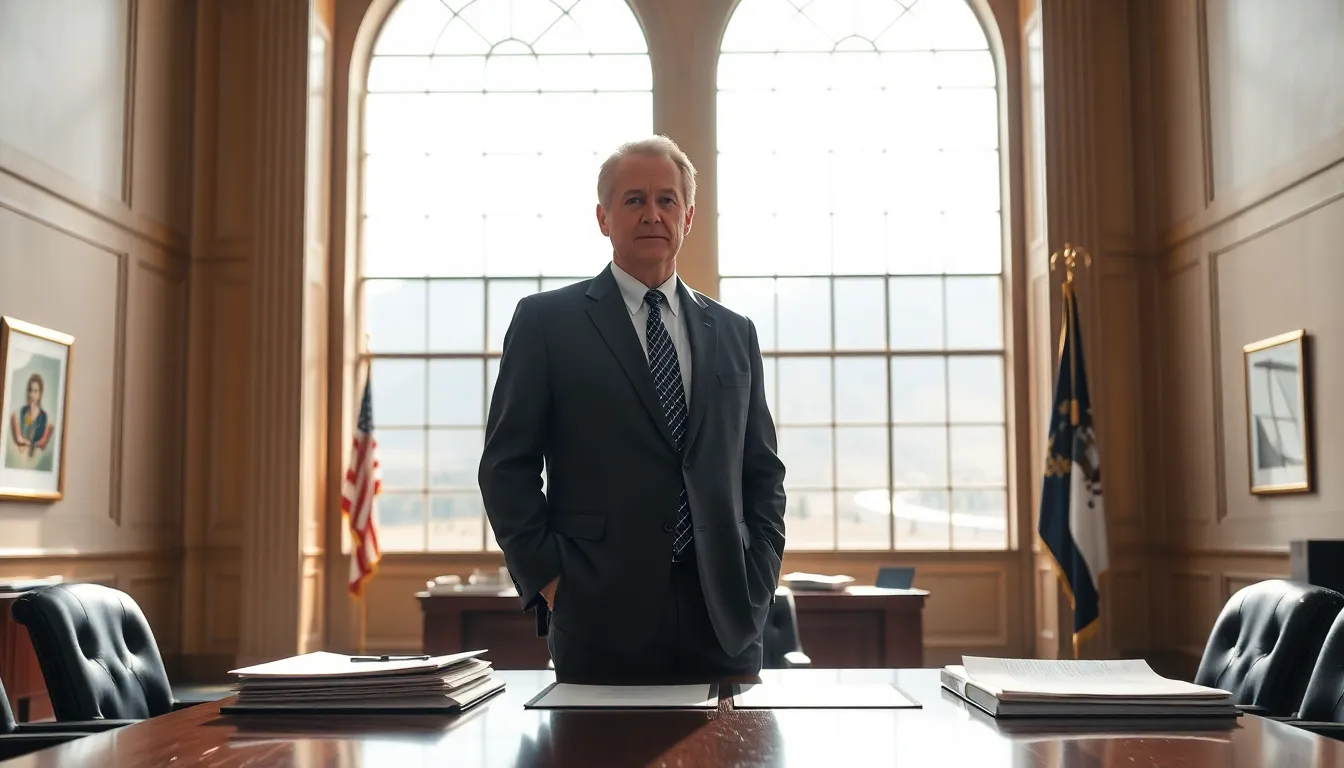Richard Whitley, longtime leader of Nevada health agencies, to retire, concluding an extraordinary 40-year career that profoundly shaped the state’s public health infrastructure. His enduring tenure included 11 years in a pivotal cabinet leadership role across three gubernatorial administrations, overseeing significant fiscal and organizational changes.
Key Implications
- Enduring Leadership: Richard Whitley’s 40-year career, including 11 years as a cabinet leader across three gubernatorial administrations, provided unparalleled continuity and institutional knowledge, ensuring stable governance and policy implementation for Nevada’s public health.
- Administrative Transformation: His extensive fiscal stewardship, managing nearly one-third of Nevada’s state budget for a decade, alongside spearheading the strategic reorganization of the former DHHS into two specialized agencies, enhanced service delivery and state negotiating power.
- Upholding Accountability: Whitley’s decisive actions in response to a legislative audit, which uncovered severe patient conditions and led to internal investigations and resignations for false statements to legislators, re-established trust and ethical standards within health agencies.

Decades of Continuous Leadership Across Three Administrations
Richard Whitley, a longtime leader of Nevada health agencies, is set to conclude an extraordinary career in public service. On November 9, 2026, he will retire, marking the end of a remarkable 40-year tenure in Nevada state service. This significant milestone also highlights his 11 years spent in a pivotal cabinet leadership role.
His extensive service demonstrates an uncommon level of dedication and continuity within state government. Whitley’s career began in 1986, positioning him as a steadfast presence through decades of change. His commitment to the state’s welfare has been a defining characteristic of his professional life.
A Legacy of Service: Four Decades in Nevada
Whitley’s career commenced in 1986, establishing a foundation of deep institutional knowledge. His four decades of service encapsulate a period of significant growth and transformation for Nevada. Throughout these years, he witnessed and contributed to the evolution of the state’s public health infrastructure and policies.
This extended duration allowed for a consistent approach to critical health initiatives. It also fostered a comprehensive understanding of the challenges and opportunities facing Nevada’s residents. His presence provided invaluable stability and experience to various state departments.
Cabinet Leadership Across Three Administrations
A notable facet of Whitley’s career is his consistent leadership within the executive branch. He ascended to a cabinet role in June 2015, a position he has maintained until his impending retirement in November 2026. This period of 11 years in cabinet leadership underscores his significant influence and responsibility.
His leadership extended across three distinct gubernatorial administrations, a testament to his professionalism and non-partisan commitment. Initially appointed by Governor Brian Sandoval in 2015, he was subsequently reappointed by Governor Steve Sisolak in 2019. Most recently, Governor Joe Lombardo reappointed him in 2023.
Serving under such varied political leadership requires exceptional adaptability and a steadfast focus on core public service values. Whitley demonstrated a remarkable capacity to navigate different policy priorities and administrative styles. His ability to secure reappointment across these administrations speaks volumes about his effectiveness.
This political resilience ensured continuity in vital state health services. His tenure has had a profound impact on the direction and stability of Nevada’s public health initiatives. He remained a trusted advisor and implementer of state health policy during changing political landscapes.
Indeed, Richard Whitley has been recognized as the longest-serving agency head in Governor Lombardo’s current cabinet. This distinction further emphasizes his profound experience and the trust placed in his leadership. Such longevity in a high-level government position is rare and speaks to his consistent performance.
Unwavering Commitment and Political Resilience
The continuity of Whitley’s public service career in Nevada, spanning from 1986 to 2026, is truly extensive. His journey from an entry-level position to a cabinet leader highlights a deep commitment to the Silver State. This dedication has undoubtedly shaped countless programs and policies impacting Nevadans.
His consistent leadership across three distinct gubernatorial administrations demonstrates extraordinary political resilience. It signifies an ability to build consensus and deliver results irrespective of the political party in power. This unique position allowed for a stable hand at the helm of Nevada health agencies during critical times.
Whitley’s career embodies a model of dedicated public service. His long-standing presence has provided institutional memory and expertise that are vital for effective governance. He has been a consistent force in advancing the health and well-being of Nevada’s population.
The specific start year of his state service in 1986 and his cabinet role in 2015, alongside his impending retirement date of November 9, 2026, frame a career dedicated entirely to the public good. His work ensured critical services remained accessible and effective for communities across Nevada. Understanding the broader context of health leadership often involves recognizing individuals like Whitley who have shaped policy and implementation over time. Further insights into the broader impact of leaders in advancing public health can be found by exploring initiatives that highlight leaders advancing health for all.
His deep understanding of state operations allowed him to implement and oversee programs effectively. This included managing complex systems that keep populations insured and safe. The challenges of maintaining robust public services, particularly in health, require this kind of long-term vision. Ensuring the public continues to receive comprehensive health support remains a paramount concern for state leaders, especially with discussions surrounding those at risk of losing coverage, like in cases where 300k are at risk of losing health insurance.
As Richard Whitley, longtime leader of Nevada health agencies, to retire, his legacy will be remembered for his steadfast commitment and leadership. His career serves as a significant example of enduring public service in Nevada.

One-Third State Budget Management and Major Health Agency Reorganization
Richard Whitley, longtime leader of Nevada health agencies, is preparing for retirement, leaving behind a remarkable legacy of public service. His extensive tenure was characterized by profound administrative responsibilities. He successfully oversaw a massive state department that managed nearly one-third of Nevada’s state budget for a full decade. This period of significant fiscal stewardship spanned from 2015 until 2025. Such a vast budget profoundly impacted millions of Nevadans through critical social and health services. Whitley’s leadership during this time was instrumental in navigating complex state finances and public policy demands.
A Decade of Fiscal Stewardship and Broad Impact
For ten consecutive years, from 2015 through 2025, the department under Richard Whitley’s guidance was responsible for an astonishing proportion of the state’s financial resources. This amounted to nearly one-third of Nevada’s entire state budget. This level of fiscal oversight speaks volumes about the department’s expansive reach and the intricate nature of its operations. Managing such a significant share of public funds involved a myriad of essential programs. These ranged from comprehensive public health initiatives, including disease prevention and health promotion campaigns, to vital social services such as child welfare, elder care, and disability support. Furthermore, the department managed extensive economic assistance programs designed to provide safety nets for vulnerable populations.
The decisions made under Whitley’s leadership directly affected the daily lives and long-term well-being of countless residents. They shaped the delivery of essential government functions across the state, ensuring that critical support systems were in place. This decade was crucial for the development, maintenance, and expansion of key health and human services infrastructure. It also involved strategic allocations for programs like Medicaid, which provides healthcare coverage to low-income individuals and families. The sheer magnitude of this budget responsibility underscores Whitley’s exceptional administrative acumen. His ability to lead a team that successfully navigated complex financial landscapes, often under intense public scrutiny, demonstrates his deep commitment to Nevada’s citizenry. Such stewardship required constant evaluation, strategic planning, and adaptive management to meet evolving state needs.
Strategic Reorganization for Enhanced Efficiency and Negotiating Power
Beyond the colossal task of budget management, Richard Whitley played a central and transformative role in a pivotal restructuring effort. He spearheaded the comprehensive division of the former Department of Health and Human Services (DHHS). This historically monolithic entity was strategically split into two distinct new organizations, a move that reshaped Nevada’s public service landscape. These new entities are the Nevada Health Authority and the Department of Human Services. This comprehensive reorganization was far more than a mere administrative reshuffling. It represented a calculated strategic decision. The primary aim was to better harness state negotiating power, thereby optimizing resource allocation and improving service delivery across Nevada.
The creation of two specialized agencies allowed for more focused leadership and more dedicated strategies for their respective domains. The Nevada Health Authority, for instance, now concentrates intently on health policy, managing public health initiatives, and overseeing healthcare delivery systems. This targeted approach empowers the state with greater leverage in health-related negotiations, whether with insurance providers, pharmaceutical companies, or federal health programs. Such focused expertise enhances the ability to secure better outcomes, more competitive rates, and improved access to care for residents. The strategic split aims to improve the overall effectiveness and responsiveness of state health services, streamlining processes and fostering innovation. Leaders advancing health often find that organizational agility is key to addressing complex challenges and achieving widespread impact. (Leaders Advancing Health) This restructuring required careful planning and execution, reflecting a forward-thinking approach to governance.
Whitley’s Ongoing Role in Human Services
Following this extensive reorganization, Richard Whitley, longtime leader of Nevada health agencies, demonstrated a continued commitment to public service. He did not step away entirely from his leadership role. Instead, he transitioned seamlessly, assuming the vital position as the head of the newly formed Department of Human Services. This continuity of leadership was crucial, ensuring a smooth transition during a period of significant operational and structural change within the state government. Whitley’s deep institutional knowledge, accumulated over years of service, proved invaluable in guiding this new department through its foundational stages. His profound understanding of state policies and community needs provided essential stability and direction.
The Department of Human Services now concentrates specifically on social welfare programs. It oversees crucial areas such as child protective services, ensuring the safety and well-being of the state’s most vulnerable children. It also manages essential aging and disability services, providing support and resources for Nevada’s seniors and individuals with disabilities. Furthermore, the department administers critical economic assistance programs designed to offer a safety net for families and individuals facing financial hardship. These programs are fundamental to supporting the most vulnerable members of society and fostering community resilience. Whitley’s continued guidance ensures that these critical services remain robust, responsive, and effectively delivered to those who need them most. His extensive experience in managing vast budgets and complex agencies directly benefits this newly focused department. The clear mandate for the Department of Human Services allows for more precise management, ensuring that specific human service needs are met with dedicated resources and expert attention. The strategic leadership under Whitley remains steadfastly focused on improving lives for all Nevadans, with a strong emphasis on maximizing the state’s capacity to keep people insured and adequately supported through various state initiatives. Ensuring access to vital services like health insurance and social assistance is a continuous, paramount effort for the department. (Keeping People Insured) His legacy includes both vast fiscal management and strategic organizational change.

Responses to Legislative Audit and Personnel Accountability
The tenure of Richard Whitley, longtime leader of Nevada health agencies, to retire, was significantly shaped by his decisive actions in response to critical administrative challenges. Among these, a comprehensive legislative audit played a pivotal role, uncovering severe conditions for patients under state care. These alarming revelations initiated a series of rigorous internal investigations, which ultimately led to specific personnel changes aimed at restoring accountability and trust within the public health system.
Whitley’s leadership was immediately put to the test when the legislative audit concluded with deeply troubling findings. This audit unequivocally stated that the state had systematically overlooked “squalid conditions” for mentally ill patients residing in taxpayer-funded properties. Such profound neglect represented a significant failure in both patient care and governmental oversight, demanding an urgent and thorough response from the highest levels of the health agencies.
Prompt Actions Following Legislative Scrutiny
In the direct aftermath of the damning legislative audit, Richard Whitley did not hesitate to initiate a robust internal investigation. This internal probe was absolutely essential to thoroughly examine the full extent of the problems identified by the audit. The primary objective was to ensure complete transparency and to hold responsible parties accountable for the systemic failures impacting vulnerable patients.
The investigation delved deep into the operational deficiencies and administrative lapses that allowed such unacceptable conditions to persist. It focused on identifying individuals directly responsible for these oversights and for any misrepresentations made to external bodies. Whitley’s commitment to addressing these deeply rooted issues was crucial for rebuilding public confidence in the state’s health services.
This rigorous internal process was far more than a mere exercise in review; it was specifically designed to expose concrete instances of negligence and mismanagement. The findings from this investigation provided a clear and actionable pathway for necessary administrative reforms. This ensured that the critical issues raised by the legislative audit were directly confronted and rectified.
Personnel Accountability and Resignations
A direct and significant outcome of Whitley’s internal investigation involved specific personnel changes within the affected health agencies. This investigation rigorously examined claims and statements that had been made to legislators regarding patient care and facility conditions. It brought to light instances where information provided was found to be inaccurate or deliberately misleading.
The gravity of these findings led directly to the two resignations of key personnel within the agencies. These departures underscored a clear and unequivocal message: accountability was paramount, especially when dealing with public trust and the critical well-being of vulnerable individuals. The resignations were specifically tied to the provision of false statements to legislators, emphasizing the severe consequences of lacking candor and integrity in public office.
These decisive personnel decisions, initiated under the direct leadership of Richard Whitley, demonstrated a firm stance against administrative deceit. They served as a critical step in beginning to rebuild the credibility of the health agencies in the eyes of the public and legislative bodies. Ensuring honest and transparent communication with legislative bodies is fundamental to effective governance and dedicated patient advocacy.
The enforcement of accountability through these resignations was a necessary and impactful measure. It helped to reinforce essential ethical standards and significantly improve overall transparency within the organization. This firm approach ensured that administrative roles were held to the highest possible standards of conduct and responsibility.
Administrator’s Resignation and Retraction: The Dena Schmidt Episode
Adding another layer of administrative complexity and scrutiny during this period was the notable situation involving Dena Schmidt, a key administrator within the agencies. Schmidt initially tendered her resignation in August, a mere two months after assuming her role in June. Her stated reason for departure was a “toxic work environment” under Whitley, a claim that naturally attracted considerable attention and public scrutiny.
This particular incident highlighted potential internal strains and significant challenges within the leadership structure, occurring at a time of intense external pressure on the agencies. An administrator citing such an environment so soon after joining typically indicates deeper systemic issues that require careful and delicate navigation. The public naturally raised questions about the stability and morale within the agency’s leadership.
However, the situation took an unexpected and noteworthy turn. Dena Schmidt subsequently rescinded her resignation and returned to her administrative position. This retraction presented its own unique set of challenges and public relations considerations, raising further questions about the initial claims and the specific reconciliation process that facilitated her prompt return. Such a quick turn of events often signals ongoing complexities within an organization’s internal dynamics and governance.
The episode involving Schmidt offered a unique and illustrative glimpse into the demanding administrative climate that Richard Whitley had to manage. It vividly underscored the immense pressures and public perceptions of leadership during a period of significant reform and intense external audit. Navigating such delicate internal matters, while simultaneously addressing pressing legislative mandates, required considerable strategic acumen and resilience.
Whitley’s adept management of these diverse challenges, ranging from critical legislative scrutiny to internal personnel upheavals, truly defines a significant aspect of his legacy. His actions were consistently aimed at restoring order, fostering accountability, and improving standards within Nevada’s health agencies. This was a complex task that required unwavering dedication to public service and a steadfast willingness to confront difficult truths.
Sustaining Trust and Ethical Governance
The profound administrative challenges faced by the health agencies under Richard Whitley highlight the critical importance of robust governance and ethical leadership in public service. Addressing squalid conditions for patients is not just a logistical task; it is fundamentally a moral imperative for any responsible public body. The legislative audit served as a vital mechanism for external oversight, prompting necessary and impactful internal reforms.
The internal investigations and subsequent personnel actions, including the resignations due to false statements, powerfully reinforced the principle that accountability must extend to all levels of leadership. Public officials are explicitly entrusted with significant responsibilities, and integrity in their dealings with both patients and legislative bodies is absolutely non-negotiable. This period of intense scrutiny ultimately aimed to foster greater transparency and rebuild trust within the public health system. Effective leaders are crucial for advancing health for all, ensuring agencies remain responsive and accountable to the public they serve.
The path forward for any public health agency, particularly after such profound challenges, involves a continuous and unwavering commitment to best practices and ethical conduct. It inherently includes fostering an environment where concerns can be raised without fear of reprisal, and where patient well-being is unequivocally prioritized above all else. The invaluable lessons learned from these experiences under the leadership of Richard Whitley underscore the constant need for vigilance and responsive administration in safeguarding and enhancing public health standards.
Featured image generated using Flux AI
The Nevada Independent: “Richard Whitley, longtime leader of Nevada health agencies, to retire”
